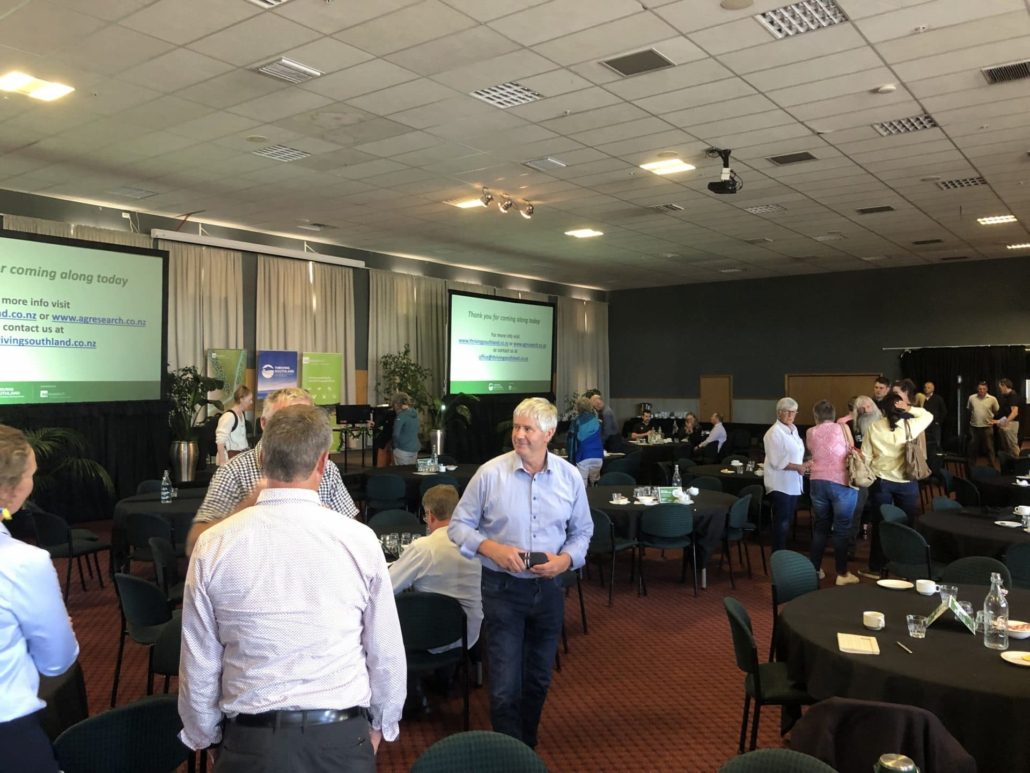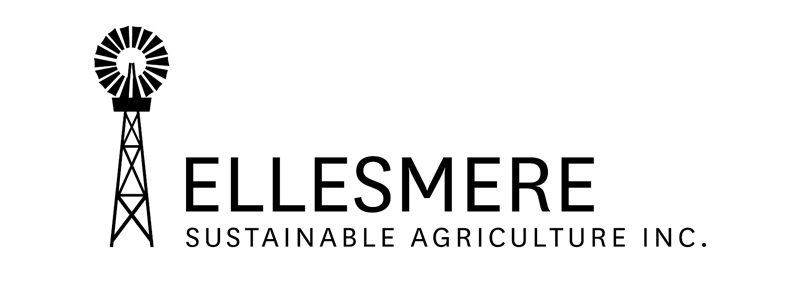Everything to Gain Event 15th Dec 2022
Around 200 people gathered at the Corinthian Centre in Invercargill on the 15th Dec to attend an event organised by Thriving Southland, (an MPI funded organisation working with catchment groups in Southland) and AgResearch titled ‘Everything to Gain-Maintaining Our International Market Position’. Jo Fearn, the Tinaku Project Extension Coordinator along with Alison Inwood and Hillary Cross both ESAI board members, flew down to Southland to attend the event.
The event was attended by farmers, rural professionals and representatives from large rural business as well as other catchment groups and agricultural organisations. The event was held in an attempt to help the agricultural sector get a better understanding of what lies ahead and what international markets and consumers are wanting from NZ agricultural products both now and in the future.
The event kicked off with Alice Ritchie presenting via Zoom from the UK. Alice, originally from NZ, works as the Agricultural Sustainability Manager for the supermarket franchise Tesco. Tesco, a major buyer of NZ products, including lamb and dairy, said that the company now has a strong focus on sustainability throughout their supply chain. They are starting to enforce strict policies around supply of products from British agriculture with respect to emissions reductions, restoring nature, protecting soil health and sustainable water management as well as a crack-down on the use of insecticides and herbicides in production. It is then expected that all of the countries from which they import products will have to prove that they are also adhering to the policies. This will be done through certification and assurance programmes. Many farmers in Ellesmere are complying with international auditing programmes to meet these overseas demands. Potentially, before long, these random audits will begin to apply to all suppliers not just a few.
Alice stated that their UK customers are looking for price over quality in the current financial crisis BUT pressure from those customers also dictates that Tesco are sourcing products that are sustainable. “Customers are no longer willing to pay a premium for sustainable products, it is expected as the norm that the products they are buying are from sustainable sources”, said Alice. She also commented that the assumption by many in the UK is that “NZ products are produced sustainably” and so “it is very important that that reputation is maintained”.
Alice also stated that it’s not just NZ farmers that are having a rough ride at the moment, farmers all over the globe are feeling the pressure from their governments to reduce agricultural emissions and be more sustainable, “New regulations around the government subsidies which keep most British farmers afloat are now being tightened and subsidies can only be received if farmers show that they are making changes to reduce their impacts on the environment”. Alice predicts that in the years to come this could see many UK farmers going out of business which could open up greater opportunities for NZ imported products to plug the gaps in the market.
Alice’s main take home message was that it is essential for NZ to maintain it’s image and reputation as a sustainable farming nation to ensure that our products continue to appear on supermarket shelves in the UK.
Simon Tucker, who is Director of Global Sustainability, Stakeholder Affairs and Trade for Fonterra, also appeared via video link. He was very clear from the outset that going forward Fonterra is now focusing on climate change, animal wellbeing and water and that this is being driven by its customers. Huge companies like Nestle, Mars, Starbucks, Danone and Unilever who are big buyers of NZ dairy products via Fonterra are all demanding aggressive reductions in emissions with many wanting a result of net zero by 2050.
“Leading in sustainability is important to the delivery of our (Fonterra’s) long term aspirations” he said “It will allow us to build resilience”. Simon pointed out that in a global market now flooded with dairy alternatives it is essential that NZ dairy products stay competitive and they are doing this by focusing on the nutrient content to carbon footprint ratio.
In answer to a question that Jo posed to Tucker about Fonterra’s focus for products in the future he said that “Fonterra would indeed be looking to move away from an emphasis on producing large quantities of milk powder in favour of higher value niche market products such as health products”, and a stronger focus on “adding value” to their dairy products.
Simon stated that it is critically important that NZ farmers continue to be sustainable. Fonterra is confident that their ‘Co-operative Difference’ payment system that was implemented in June 2021 will play an integral role in achieving this. This system means that each farm’s milk payment is affected by the achievement of key practices on farm that are important for the future. The five fundamental aspects of the system are: People & Community, Environment, Animals, Co-Op Prosperity and Milk. Those that have taken the opportunity to begin environmental improvements on-farm via the Tinaku Project and other local environmental projects are well placed in these sorts of scenarios.
Simon also declared that Fonterra is investing large amounts of money into reducing emissions on farm but is doing so by setting achievable targets.

Alison Inwood, Jo Fearn & Hillary Cross attend the Everything to Gain event in Southland last month.
The third speaker of the was Sinead Leahy, the Principal Science Adviser with AgResearch. Sinead gave a good rundown of the current global climate change situation and how further changes to the climate would be likely to impact NZ, “Further changes in temperatures could mean that parts of NZ are no longer suitable for growing certain crops. Rye grass for example is a temperate species and a rise in temperature in parts could mean that farmers can no-longer grow it”.
Sinead believes, like the others that spoke at the event, that most of the demands and pressure to reduce emissions from agriculture and produce more sustainable agricultural products is not coming from governments but by global consumer markets, “It’s the big companies that are demanding that changes need to be made”.
Leahy spoke about the extensive work that has been done over the last decade at AgResearch and other labs all over the world to try and develop technologies to reduce methane emissions from ruminants. Animal breeding for low methane emission is one method that is already taking place here in NZ and could prove beneficial in the short term potentially reducing emissions by up to 10%. Scientists are now working with industry to begin a breeding programme for both sheep and cattle in NZ which naturally emit lower levels of methane.
Other technologies being worked on include feed additives and other methane inhibitors although many of these technologies would be less suitable for the NZ mostly pastoral system. Probably the most exciting technology that has the capacity to reduce methane emissions by over 30% is a methane inhibitor vaccine that could be given to an animal on an annual basis but unfortunately, Sinead believes, this is some time off.
Sinead’s closing comments were that science is making progress towards assisting NZ in its emission reduction targets and hopes that with increased funding into research and development some of these technologies could be an option for NZ farmers in the future.
After lunch, Rod Carr Chairperson of the NZ Climate Change Commission addressed the audience. The emphasis of Rod’s presentation very much focused around New Zealand in a global context. Many believe that the NZ Government shouldn’t be reducing emissions so drastically and enforcing levies on methane as NZ only produces a very small amount of GHG emissions when compared with other nations. However, Carr was adamant that the changes the Government is making will be beneficial not only to the global climate but are also important for New Zealand, “ Making these changes is for our own benefit, it is in our own self-interest” he said. Each country is responsible for doing all that it can to reduce its own emissions. He also pointed out that NZ is in fact one of the highest polluting countries in the world on a per capita basis.
At the moment, the effects of climate change are only being felt very mildly in NZ. In other parts of the world climate change is having huge impacts. It is the more affected countries that are demanding the changes and whilst the press tend to focus on the likes of China who are still building coal fired power plants, it’s not often reported the significant changes that many high polluting countries are making to reduce their impacts on the climate.
Carr stated that although the attention is all on reducing agricultural emissions at the moment the NZ Government is also committed to reducing emissions from transport and industry and is looking into the potential expansion of wind generated power especially in the Southland region.
With a long background in business, economics and finance, Carr also highlighted the potential global financial implications of climate change. The world’s economies and large global businesses are starting to feel anxious about the impacts climate change is having and will have if things continue to worsen. Carr predicts that in the very near future global banking will begin assessing its impacts on climate change and start to move away from financing polluters. This could well trickle down to a smaller scale of NZ banks tightening their lending criteria based on sustainability, emissions and impacts on the environment.
The last speaker of the day was Vangelis Vitalis the Deputy Secretary Trade and Economic with the Ministry of Foreign Affairs & Trade. Vangelis spends the majority of his time travelling the world negotiating trade agreements for NZ products. He has noticed, in the last few years, that there has been a major shift in what other governments are looking for when discussing trade agreements, “80-90% of the questions I get asked now are around the sustainability of our products and what measures we are taking to reduce GHG emissions in New Zealand”.
The Free Trade Agreements (FTA) have huge potential for the export of NZ products to the rest of the world. Without FTA’s NZ can be disadvantaged by having tariffs applied to exported products. Vitalis conveyed that “Without Free Trade Agreements with other countries these tariffs can be a huge issue for a small nation like NZ ”, “FTA’s level the playing field, remove tariffs and ultimately mean more profit for our farmers and our growers”. Another advantage of FTA’s is the ability of small markets like NZ to challenge much bigger economies over unfair trade practices. This was the case recently where NZ challenged Canada on its administration of tariffs on NZ dairy products.
Firstly, the FTA’s are negotiated and then they have to be ratified by the relevant governments and this means that difficult questions are asked “They want to know what is NZ’s approach to climate change? What are NZ’s targets for reducing emissions? They want to see that NZ is reaching its targets and reducing its impacts on the environment”, therefore “for NZ to stay competitive we have to prove that measures are being taken, we are such a small player that it means nothing for a government to dismiss a FTA and refuse to trade with us but it could mean a great deal to the NZ market”.

The event was a good opportunity for farmers, rural professionals and other catchment groups to hear from experts on the future of farming



